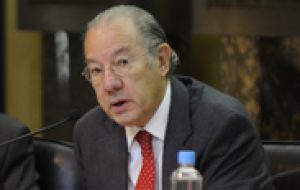MercoPress. South Atlantic News Agency
Mercosur “too small” for Brazil, claims Sao Paulo federation of industries
 Rubens Barbosa head of FIESP foreign trade council.
Rubens Barbosa head of FIESP foreign trade council. One of Brazil’s most influential lobbies, the Sao Paulo Federation of Industries, FIESP, claims that Mercosur is an economic space “too small” given the development and “growing international presence of Brazil”.
“Mercosur from a trade angle and Latin America from a political angle are turning to be too small for the global interests of Brazil”, said Rubens Barbosa head of FIESP foreign trade council.
Barbosa pointed out that lately Brazil and China, strong trade allies, have become decisive players in the reorganization of global production, following the 2008 downfall, and are increasingly responsible for the growing presence of developing countries in the international stage and in decision making.
The FIESP official also mentioned the growing spaces Brazil has conquered in international forums such as the G20 and the United Nations.
“For these reasons Brazil is targeting to expand its international role and Mercosur restricts that advance”, insisted Barbosa.
FIESP has been particularly critical of Mercosur and has on several occasions requested the two leading presidential candidates, incumbent Dilma Rousseff and opposition representative Jose Serra to review relations with the South American block that also includes as full members: Argentina, Paraguay and Uruguay, and probably in a near future Venezuela.
Barbosa speaking for FIESP suggested that several clauses from the Mercosur charter must be changed, particularly the one which impedes Brazil, or any other member, to sign unilateral trade agreements with third countries, unless there’s a consensus position inside the block.
In related news Argentine Production Minister Débora Giorgi and Economy Minister Amado Boudou are travelling to San Pablo to negotiate with their Brazilian counterparts on a more balanced bilateral commerce.
According to official data from Brasilia, the trade balance favours Brazil at around 920 million dollars within the context of an Argentine commercial surplus reduction.
Argentina has maintained commercial measures and licenses that block importation of Brazilian products, which is something that businessmen from Brazil want to revise.
Giorgi, who is running the negotiations, said that the goal of the meeting is to “work on measures that will allow for a more balanced industrial development for both countries and also build on that commerce, which is unfavourable for Argentina at the moment.”




Top Comments
Disclaimer & comment rules-

-

Read all commentsWhat Brazil needs to do is to rise above its South American and join a mature democratic world community. Most important to distance itself from backward remnants like Argentina and Venezuela. May have to take a bit of stick for a while, but it'll be worth it to be working with grown-ups.
Jun 24th, 2010 - 06:14 pm 0Barbosa has ties with opposition presidential candidate Serra. He is using his influence within FIESP to give support for Serra's clumsy remarks on Mercosur in April 2010. Unless Brazil become an island, to dissociate from its neighbors, either comercially or politically, is just not an option. And even if it were, it wouldn't be a wise one. Even the US needs to maintain a close relationship with its smaller - much smaller - neighbors Mexico and Canada.
Jun 30th, 2010 - 07:06 pm 0Most of the market for Brazil's industrial products are those furnished by Mercosur, specially Argentina. In the Brazilian perspective, Mercosur is also an useful tool for political bargain. That the bloc needs to be improved, no one denies. Even the EU needs to be improved, and the EU is 50 years old already (Mercosur is 16). The wise solution for Brazil is to streghthen its Mercosur partners economically and then to expand the bloc's market. Venezuela is a good option for such an expansion. Its population is not poor in Latin American standards, and its energy sector is a powerful one - one not even the US can ignore. Peru - with which Brazil has reached an energy agreement - and Bolivia are also potential partners of interest. A Brazilian historian, Moniz Bandeira, has even suggested South Africa as an interest choice for a Mercosur expansion.
I remember that in 2008 Barbosa complained Brazil's exports to the US had decreased in proportional (though not in absolute) terms from 20% to 14%. He complained about that, but given the economic crisis that has rocked mainly the developed economies - the US included -, to seek commercial partners outside of the developed world now seems to have been a very wise move. With that in mind, I wouldn't give Barbosa's words much consideration.
Commenting for this story is now closed.
If you have a Facebook account, become a fan and comment on our Facebook Page!